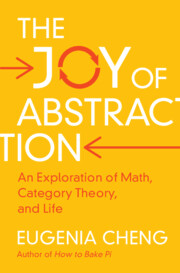Book contents
- Frontmatter
- Dedication
- Contents
- Prologue
- Part One Building up to Categories
- Interlude A Tour of Math
- Part Two Doing Category Theory
- 14 Isomorphisms
- 15 Monics and epics
- 16 Universal properties
- 17 Duality
- 18 Products and coproducts
- 19 Pullbacks and pushouts
- 20 Functors
- 21 Categories of categories
- 22 Natural transformations
- 23 Yoneda
- 24 Higher dimensions
- Epilogue Thinking categorically
- Appendices
- Glossary
- Further Reading
- Acknowledgements
- Index
24 - Higher dimensions
from Part Two - Doing Category Theory
Published online by Cambridge University Press: 13 October 2022
- Frontmatter
- Dedication
- Contents
- Prologue
- Part One Building up to Categories
- Interlude A Tour of Math
- Part Two Doing Category Theory
- 14 Isomorphisms
- 15 Monics and epics
- 16 Universal properties
- 17 Duality
- 18 Products and coproducts
- 19 Pullbacks and pushouts
- 20 Functors
- 21 Categories of categories
- 22 Natural transformations
- 23 Yoneda
- 24 Higher dimensions
- Epilogue Thinking categorically
- Appendices
- Glossary
- Further Reading
- Acknowledgements
- Index
Summary
In this final chapter we continue applying the principle of looking at relationships between things, giving more dimensions. We define 2-categories directly, inspired by our understanding of categories, functors, and natural transformations. We revisit the definition of category by homsets, and generalize it to give the definition of 2-category by enrichment. We revisit the definition of category by underlying graph, and generalize it to give the definition of 2-category by underlying 2-graph. We define the two types of duality for 2-categories, and discuss the appropriate notions of sameness for different dimensions of morphism in a 2-category. We define monoidal categories as 2-categories with only a 0-cell, and show the dimension shift that is analogous to the one for monoids and categories. We discuss the issue of strictness and weakness, give the unit triangle and associativity pentagon, and discuss coherence. We discuss degeneracy and the Eckmann–Hilton argument, leading to braidings. We give an introduction to how research proceeds up the dimensions, giving an overview of various approaches. The chapter becomes less formal and rigorous as we end with a taste of open research.
- Type
- Chapter
- Information
- The Joy of AbstractionAn Exploration of Math, Category Theory, and Life, pp. 368 - 395Publisher: Cambridge University PressPrint publication year: 2022



